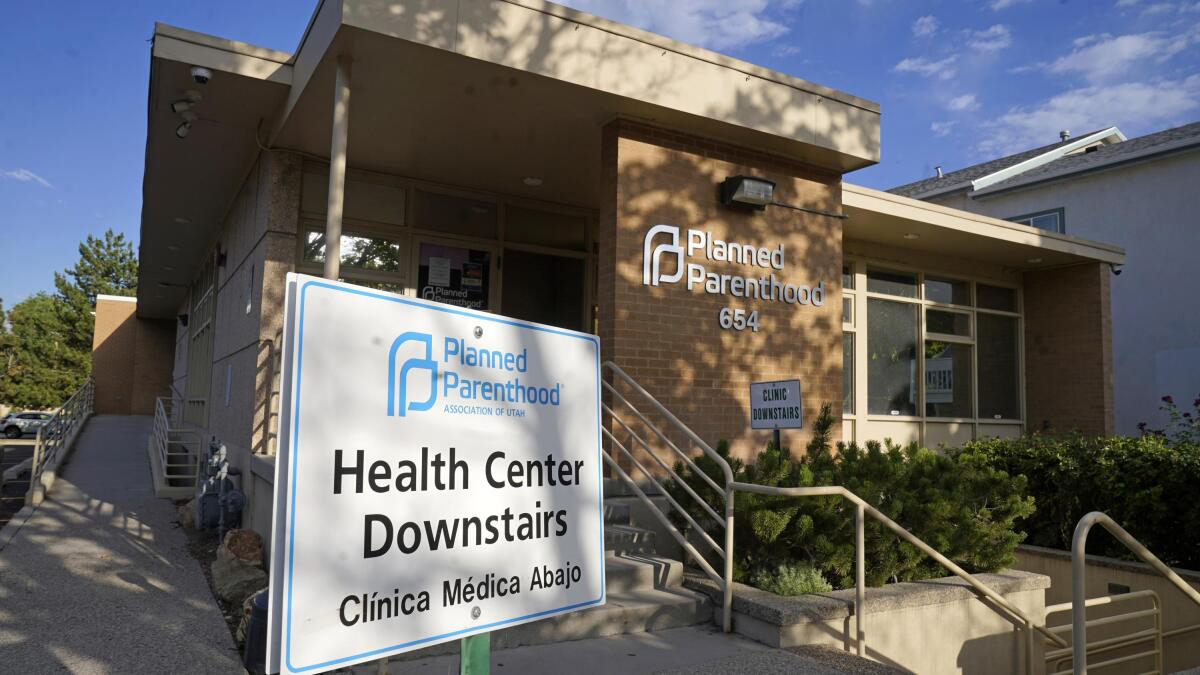Home>Finance>How Much Funding Does Planned Parenthood Received From The Government


Finance
How Much Funding Does Planned Parenthood Received From The Government
Published: December 22, 2023
Discover how much financial support Planned Parenthood receives from the government and understand its impact on their operations and services.
(Many of the links in this article redirect to a specific reviewed product. Your purchase of these products through affiliate links helps to generate commission for LiveWell, at no extra cost. Learn more)
Table of Contents
Introduction
Planned Parenthood is a non-profit organization that provides reproductive healthcare services to millions of individuals across the United States. With its network of health centers, Planned Parenthood offers a wide range of healthcare services, including contraception, sexually transmitted infection (STI) testing and treatment, cancer screenings, and abortion services.
As one of the leading providers of reproductive healthcare, Planned Parenthood plays a pivotal role in ensuring access to affordable and comprehensive healthcare for individuals, particularly those with limited resources. However, the organization has often been a subject of controversy and debate, with one of the central issues surrounding its funding sources.
Understanding the funding of Planned Parenthood is essential to grasp the organization’s financial situation and its ability to provide quality healthcare services to its patients. While Planned Parenthood relies on various sources of funding, one of the significant contributors is the government. The allocation of government funding to Planned Parenthood has sparked intense discussions and garnered attention from both supporters and opponents of the organization.
This article will delve into the amount of funding that Planned Parenthood receives from the government, the controversies surrounding it, and the impact of government funding on the organization’s operations. We will explore the opposing viewpoints on government funding for Planned Parenthood and provide a comprehensive understanding of this critical aspect of the organization’s finances.
It’s important to note that this article aims to provide an objective analysis of the funding of Planned Parenthood, highlighting the different perspectives involved. By gaining insight into this complex issue, readers can form their own informed opinions on the matter.
Overview of Planned Parenthood
Planned Parenthood Federation of America, commonly referred to as Planned Parenthood, is a non-profit organization that has been providing reproductive health services to individuals for over 100 years. Founded in 1916, Planned Parenthood has become a trusted and reputable resource for reproductive healthcare and education.
The organization’s mission is to ensure that individuals have access to comprehensive reproductive healthcare and accurate information to make informed decisions about their sexual and reproductive health. With a network of over 600 health centers nationwide, Planned Parenthood offers a wide range of services, including contraception, STI testing and treatment, cancer screenings, pregnancy testing and options counseling, and abortion services.
Planned Parenthood operates with the belief that sexual and reproductive health is a fundamental right, and their services are provided on a sliding scale based on income, ensuring that low-income individuals can access the care they need. The organization is committed to promoting comprehensive sexual education, advocating for reproductive rights, and fighting against policies that restrict access to reproductive healthcare.
In addition to its healthcare services, Planned Parenthood also engages in research and advocacy efforts to advance reproductive healthcare policies and address health disparities. The organization works tirelessly to break down barriers to care and decrease the stigma surrounding reproductive healthcare.
Planned Parenthood has played a significant role in ensuring access to reproductive healthcare services, particularly for individuals who may not have otherwise had access to affordable and comprehensive care. The organization remains a vital resource for individuals seeking safe and confidential reproductive health services.
Funding Sources for Planned Parenthood
Planned Parenthood relies on a diverse range of funding sources to support its operations and provide quality healthcare services. These funding sources include:
- Government Funding: The federal and state governments provide a significant portion of Planned Parenthood’s funding. This funding comes in the form of grants and reimbursements for the services provided by the organization. Government funding is vital to ensure that Planned Parenthood can continue to serve patients who rely on their services.
- Private Donations: Planned Parenthood receives donations from individuals, foundations, and corporations who believe in the organization’s mission and want to support its work. These private donations can come in various forms, including one-time contributions, recurring donations, and major gifts. Private donations play a crucial role in supplementing government funding and providing additional resources for Planned Parenthood’s programs and services.
- Health Insurance Reimbursements: Planned Parenthood is also reimbursed for the healthcare services it provides through health insurance coverage. This includes services such as contraception, STI testing, cancer screenings, and other preventive care procedures. Health insurance reimbursements help offset the costs of providing care and ensure that patients can access services without facing significant financial burdens.
- Medicaid and Title X Funding: Medicaid and Title X are government programs that provide funding specifically for reproductive healthcare services. Medicaid is a federally-funded healthcare program that offers coverage for eligible low-income individuals, while Title X is a federal grant program focused on family planning and reproductive healthcare. Planned Parenthood receives funding from both Medicaid and Title X to support the provision of essential reproductive healthcare services to those in need.
- Other Revenue Streams: Planned Parenthood also generates revenue from other sources, such as patient fees, reimbursements from other healthcare programs and insurance plans, and income from education and outreach programs. These additional revenue streams help diversify the organization’s funding sources and support its ongoing operations.
By leveraging these various funding sources, Planned Parenthood can continue to provide essential reproductive healthcare services to millions of individuals across the country. The combination of government funding, private donations, health insurance reimbursements, Medicaid and Title X funding, and other revenue streams ensures that the organization can maintain its commitment to accessible and affordable healthcare for all.
Government Funding for Planned Parenthood
Government funding plays a significant role in supporting Planned Parenthood’s operations and enabling the organization to provide comprehensive reproductive healthcare services to millions of individuals. The allocation of government funding to Planned Parenthood has been a subject of debate and controversy for many years.
The main sources of government funding for Planned Parenthood include federal and state grants, as well as reimbursements for services provided to patients eligible for government-funded healthcare programs such as Medicaid and Title X.
On the federal level, Planned Parenthood receives funding through grants from various government agencies, including the Department of Health and Human Services (HHS). These grants support a wide range of reproductive healthcare services, including contraception, cancer screenings, STI testing and treatment, and education and outreach programs.
One major source of government funding for Planned Parenthood is the Title X Family Planning Program. Title X aims to provide affordable family planning and reproductive healthcare services to low-income and uninsured individuals. Planned Parenthood has been a key participant in the Title X program, with its health centers serving as crucial access points for individuals seeking affordable family planning care.
Planned Parenthood also receives reimbursements from Medicaid for services provided to patients covered by the program. Medicaid is a state and federally-funded healthcare program that provides coverage for low-income individuals and families. In some states, Medicaid funding may be used to cover abortion services in cases that meet specific legal requirements.
It is important to note that federal law prohibits the use of federal funding, including Medicaid reimbursements, for most abortion services. The Hyde Amendment, a legislative provision that has been renewed annually since 1976, prohibits the use of federal funds for abortions, except in cases of rape, incest, or when the woman’s life is at risk. Planned Parenthood adheres to these guidelines and ensures that federal funds are not used for abortion services, except in the permitted circumstances as defined by law.
In addition to federal funding, Planned Parenthood also receives funding from state governments. State grants and contracts help support the organization’s healthcare services at the local level, ensuring that individuals in different communities have access to vital reproductive healthcare resources.
Government funding is crucial to the sustainability and operation of Planned Parenthood. It enables the organization to reach underserved populations, provide affordable reproductive healthcare services, conduct vital research, and deliver education and advocacy programs. It is worth noting that the allocation of government funds to Planned Parenthood has been the subject of political debate and policy changes, with implications for the organization’s financial stability and ability to serve its patients effectively.
Controversies and Debates
Planned Parenthood has been at the center of numerous controversies and debates throughout its existence. These controversies primarily revolve around the organization’s provision of abortion services, government funding, and the broader topic of reproductive rights. Here are some key controversies and debates surrounding Planned Parenthood:
- Abortion Services: One of the most contentious issues is Planned Parenthood’s provision of abortion services. Opponents of the organization argue that government funding indirectly supports abortions, despite federal law prohibiting the use of federal funds for most abortion services. This has led to ongoing debates about the role of Planned Parenthood in providing reproductive healthcare, including the question of whether the organization should receive government funding.
- Government Funding: The allocation of government funding to Planned Parenthood has been a topic of intense debate. Opponents of the organization argue that government funds should be redirected to other healthcare providers that do not offer abortion services. On the other hand, supporters argue that defunding Planned Parenthood would limit access to essential reproductive healthcare services for millions of individuals who rely on the organization for affordable and accessible care.
- Reproductive Rights: Planned Parenthood is strongly associated with the fight for reproductive rights. Some individuals and organizations view the organization as a champion for reproductive justice, advocating for the right to access safe and legal abortion services, contraception, and comprehensive sexual education. However, others oppose what they perceive as an unrestricted promotion of abortion and challenge the notion of reproductive rights.
- Investigations and Allegations: Planned Parenthood has faced several investigations and allegations from anti-abortion groups and politicians. One highly-publicized controversy involved the release of edited and misleading undercover videos that purported to show Planned Parenthood officials discussing the sale of fetal tissue, which is illegal. These allegations led to congressional hearings and increased scrutiny of the organization.
- Political and Policy Battles: The controversies surrounding Planned Parenthood often become entangled with broader political and policy battles. Different political factions and advocacy groups have differing stances on reproductive rights, resulting in ongoing conflict over issues such as access to contraception, the legality and availability of abortion services, and the role of government funding in supporting reproductive healthcare providers.
These controversies and debates have profound implications for both the organization and the individuals it serves. They highlight the deeply divisive nature of reproductive healthcare and the ongoing struggle to ensure access to comprehensive and affordable reproductive services for all individuals.
It is essential for individuals to stay informed and engaged in these debates to understand different perspectives and form their own opinions on the issues surrounding Planned Parenthood and reproductive rights.
Impact of Government Funding on Planned Parenthood
The government funding that Planned Parenthood receives has a significant impact on the organization’s ability to provide essential reproductive healthcare services to individuals across the country. Here are some key aspects of the impact of government funding on Planned Parenthood:
- Access to Healthcare: Government funding allows Planned Parenthood to offer affordable and accessible healthcare services to individuals who may not have the resources to access healthcare elsewhere. Many patients rely on Planned Parenthood as their primary healthcare provider, particularly for reproductive and sexual health services. Without government funding, these individuals may face barriers to receiving necessary care.
- Reach and Availability: Planned Parenthood operates a vast network of health centers that span rural, urban, and underserved areas. Government funding enables Planned Parenthood to maintain and expand its reach, ensuring that individuals who live in areas with limited healthcare options can still access comprehensive reproductive healthcare services. Without government funding, the capacity of Planned Parenthood to serve these communities would be significantly diminished.
- Preventive Care and Education: Government funding supports Planned Parenthood’s efforts to provide preventive care services, including cancer screenings, STI testing, contraception, and education programs. These services are crucial for promoting public health and preventing the spread of diseases. Without government funding, the availability of these preventive care services and educational resources would be compromised, leading to potential negative health outcomes.
- Research and Advocacy: Government funding also plays a role in supporting Planned Parenthood’s research initiatives and advocacy efforts. This funding enables the organization to conduct studies and collect data on reproductive healthcare outcomes, disparities, and emerging trends. Additionally, government funding helps Planned Parenthood advocate for policies that advance reproductive healthcare access and protect individuals’ reproductive rights.
- Impact on Low-Income Individuals: Planned Parenthood’s ability to offer services on a sliding scale based on income is largely dependent on government funding. Low-income individuals often rely on Planned Parenthood for affordable reproductive healthcare options. Without government funding, the availability of discounted or no-cost services for these individuals would be severely limited, potentially resulting in decreased access to critical healthcare resources.
It is important to note that changes in government funding and policies can have a direct impact on Planned Parenthood’s operations and ability to provide services. Funding fluctuations, restrictions, or the loss of funding altogether can lead to clinic closures, reduced services, and increased financial burdens on patients.
Furthermore, the debates surrounding government funding and Planned Parenthood have broader implications for reproductive healthcare access and the ongoing fight for reproductive rights. The availability of government funding shapes the landscape of the healthcare system and influences the options available to individuals seeking reproductive healthcare services.
Overall, government funding plays a vital role in supporting Planned Parenthood’s mission and ensuring that individuals have access to comprehensive and affordable reproductive healthcare services. Its impact extends beyond the organization itself, affecting the health and well-being of millions of individuals who rely on these services to make informed decisions about their reproductive health.
Opposing Views on Government Funding for Planned Parenthood
The issue of government funding for Planned Parenthood is highly divisive, eliciting opposing viewpoints and strong opinions. Here are some of the arguments put forth by both supporters and opponents:
Supporters of Government Funding for Planned Parenthood
- Access to Essential Healthcare: Supporters argue that government funding for Planned Parenthood is crucial to ensuring access to essential reproductive healthcare services, particularly for marginalized and low-income individuals. They contend that without this funding, many patients would struggle to find affordable and accessible healthcare alternatives.
- Preventive Care and Public Health: Supporters point out that Planned Parenthood’s focus on preventive care, such as contraception, cancer screenings, and STI testing, contributes to overall public health. They argue that government funding for these services helps prevent unplanned pregnancies and reduce the spread of sexually transmitted infections, leading to improved health outcomes.
- Addressing Health Disparities: Supporters argue that government funding for Planned Parenthood is necessary to address health disparities and ensure healthcare equity. They contend that the organization’s outreach efforts and culturally sensitive care play a vital role in reaching underserved communities and bridging gaps in healthcare access and service quality.
- Reproductive Rights and Autonomy: Supporters emphasize that government funding for Planned Parenthood is essential for protecting individuals’ reproductive rights and ensuring their autonomy over their bodies. They argue that restricting or eliminating such funding would be an attack on reproductive rights and hinder individuals’ ability to make informed decisions about their reproductive health.
Opponents of Government Funding for Planned Parenthood
- Abortion Controversy: Opponents argue against government funding for Planned Parenthood due to its provision of abortion services. They assert that taxpayer dollars should not go towards supporting organizations that offer abortions, as it goes against their moral or religious beliefs.
- Alternative Healthcare Providers: Opponents of government funding for Planned Parenthood argue that there are alternative healthcare providers available that do not offer abortion services. They propose redirecting funds to these providers as they believe it would be a more appropriate use of taxpayer dollars.
- Financial Viability: Some opponents claim that Planned Parenthood does not need government funding due to its other revenue sources, such as private donations and patient fees. They argue that government funds should be allocated to organizations and programs in greater need of financial support.
- Separation of Government and Abortion Services: Opponents argue that government funding for Planned Parenthood blurs the line between government and the provision of abortion services. They contend that taxpayer dollars should not be used to support organizations involved in controversial procedures like abortion.
These opposing views reflect the ongoing debates surrounding government funding for Planned Parenthood. The issue encompasses various factors, including ideological beliefs, access to healthcare, reproductive rights, and the role of government in funding healthcare services. It is a topic that continues to be highly contentious and influential in shaping policies and decisions related to reproductive healthcare access in the United States.
Conclusion
The issue of government funding for Planned Parenthood is a complex and highly debated topic that encompasses various perspectives and considerations. As a key provider of reproductive healthcare services, Planned Parenthood relies on government funding to support its operations and ensure access to affordable and comprehensive care for millions of individuals across the country.
Supporters of government funding argue that it is essential in providing access to essential healthcare, promoting preventive care and public health, addressing health disparities, and protecting reproductive rights and autonomy. They contend that without this funding, vulnerable populations would face significant barriers to quality reproductive healthcare services.
On the other hand, opponents of government funding for Planned Parenthood raise concerns about the organization’s provision of abortion services, the availability of alternative healthcare providers, the financial viability of the organization, and the separation of government and controversial procedures such as abortion.
Ultimately, the impact of government funding on Planned Parenthood is far-reaching. It allows the organization to reach underserved communities, provide preventive care and education, conduct research and advocacy, and ensure affordable and accessible healthcare options for individuals with limited financial resources.
Regardless of one’s stance on government funding for Planned Parenthood, it is evident that the allocation of funds has profound implications for individuals’ reproductive healthcare and rights. The ongoing debates and controversies surrounding this topic highlight the ongoing struggle to balance different ideological viewpoints, access to healthcare, and the role of government in funding healthcare services.
As this issue continues to evolve, it is crucial for individuals to stay informed, engage in informed discussions, and advocate for healthcare policies that align with their beliefs and values. The broader conversation surrounding government funding for Planned Parenthood serves as a reminder of the complexities and importance of reproductive healthcare access for all individuals.














